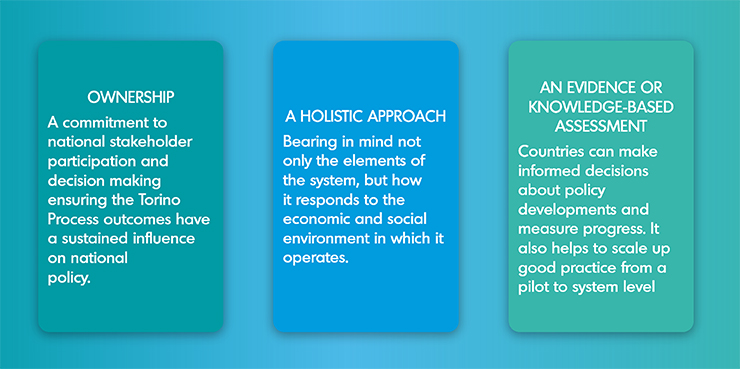Breadcrumb
- Home
- Newsroom & events
- Newsletters
- Current: The ETF Torino Process round six: 2022 to 2024

The ETF Torino Process round six: 2022 to 2024
The Torino Process is a biennial review of vocational education and training systems within a lifelong learning perspective. It was established by the European Training Foundation (ETF) in 2010 and has been carried out in partner countries in South Eastern Europe, Turkey, Eastern Europe, Central Asia and the Southern and Eastern Mediterranean since then.
The Torino Process is designed to describe and analyse developments and challenges in human capital development and the ways in which national vocational education and training systems address them.
Since its inception in 2010, the Torino Process has gathered a valuable repository of information and data, which is used for monitoring and policy planning purposes by national and regional governments, international partners and increasingly by researchers working in the field.
Key features of the Torino Process

The Torino Process has constantly adapted itself to changing needs, circumstances and country priorities. Every round has had its own specific focus and corresponding adaptations to its analytical framework and evidence collection, interpretation and presentation methodology.
The sixth round: Towards lifelong learning
The Torino Process 2022-24 looks at system performance and lifelong learning. A new analytical framework has been designed accordingly. The focus in on two levels:
- Monitoring system performance of lifelong learning
- to track the performance of education and training systems in terms of creating suitable and equitable opportunities for lifelong learning based on a carefully selected set of indicators; and
- Reviewing policies for lifelong learning
- to explain the results from level one and analyse relevant policies in order to put forward recommendations for improvement
LEVEL 1 includes a carefully selected set of indicators to track system performance in areas linked to lifelong learning.
LEVEL 2 covers a selection of thematic policy areas to support the interpretation of monitoring results and the identification of ways to
improve system performance in a lifelong learning perspective. It is designed to be highly participatory, and involves documenting and
interpreting the effectiveness of policies and systemic arrangements against the backdrop of:
1. Demand for learning opportunities; and,
2. Relevant socio-economic and demographic developments which may influence demand
Timeframe

Watch the video to see how the Torino Process has evolved until now